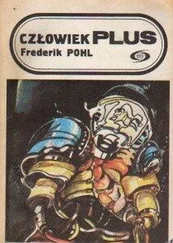One week before arrival, they began to speed Roger up.
For Roger the seven months had felt like thirty hours, subjective time. It had been time enough. He had eaten a few meals, exchanged several dozen communications with the rest of the crew. He had received messages from Earth and returned a few of them. He had asked for his guitar, been refused it on the grounds that he couldn’t play it, asked for it anyway out of curiosity and found that that was quite true: he could pluck a string, but he could not hear the note that resulted from it. In fact, apart from the specially slowed-down tapes, he could hear nothing at all most of the time, and only a sort of high-pitched scurrying sound ever. Air did not conduct the sort of vibrations he could perceive. When the tape recorder was out of contact with the metal frame to which he was bound, he could not hear even it, nor could his own voice be made to record.
They warned him they were beginning to accelerate his perceptions. They left the curtain to his cubicle open, and he began to notice flickers of motion. He caught a glimpse of Hesburgh dozing nearby, then saw figures actually moving; after a time he even recognized who they were. Then they put him to sleep, to make final adjustments on his backpack, and when he woke up he was alone, the curtain was drawn — and he heard voices.
He pushed the curtain aside and looked out, and there was the smiling face of his wife’s lover greeting him. “Good morning, Roger! Nice to have you with us again.”
…And eighteen minutes later, twelve travel time and the rest decoding and relaying, the President watched it happen from more than a hundred million miles away, on the screen in the Oval Office.
He was not the only one. The TV nets put the scene on the air, and the satellites rebroadcast it all over the world. They were watching in the Under Palace in Peking, and, inside the Kremlin; on Downing Street and the Champs Elysees and Ginza.
“Son of a bitch,” said Dash historically, “they’ve made it.”
Vern Scanyon was with him. “Son of a bitch,” he echoed. Then he said, “Well, almost made it. They’ve still got to land.”
“Any problem about that?”
Cautiously: “Not as far as I know—”
“God,” said the President positively, “would not be so unfair. I think you and I are going to taste some bourbon right now; it’s about that time.”
They stayed and watched for half an hour, and a quarter of a bottle. On and off over the next few days they watched more, they and the rest of the world. The whole world saw Hesburgh making final checks and preparing the Mars-lander for separation. Watched Don Kayman go through a dry run under the pilot’s microscopic observation, since he would be at the controls for the trip down out of orbit. Watched Brad make a final, ultimate recheck on Roger’s telemetry, find it all functioning in the green, and then do it over one more time. Watched Roger himself moving about the crew cabin and squeezing into the lander.
And watched the lander separate and Hesburgh look wistfully out at its minus-delta flare as it began to drop out of orbit.
We figured that three and a quarter billion people watched the landing. It was not much to watch; if you have seen one landing you have seen them all. But it was important.
It began at a quarter to four in the morning, Washington time, and the President had himself awakened to see it. “That priest,” he said, frowning, “what kind of a pilot is he? If anything goes wrong—”
“He’s checked out, sir,” soothed his NASA aide. “Anyway, he’s actually only about a third-place back-up. The automatic sequencing is in primary control. If anything goes wrong, General Hesburgh is monitoring it from the orbiter and he can override. Father Kayrnan doesn’t have anything to do unless everything goes wrong at once.”
Dash shrugged, and the aide noticed that the President’s fingers were crossed. “What about the follow-up flights?” he asked, staring at the screen.
“No sweat at all, sir. The computer will inject into Mars orbit in thirty-two days, and the generator twenty-seven days later. As soon as the lander is down General Hesburgh is going to perform a course correction and overtake the moon Deirnos. We expect to land both the computer and the generator there, probably in the crater Voltaire; Hesburgh will make that determination for us.”
“Um,” said the President. “Has Roger been told who’s on the generator spacecraft?”
“No, sir.”
“Um.” The President abandoned the television screen and got up. At the window, staring out at the pretty White House lawn, June-green and blossoming, he said, “There’s a man coming over from the computer center in Alexandria. I’d like you to be here when he arrives.”
“Yes, sir.”
“Commander Chiaroso. Supposed to be pretty good. Used to be a professor at M.I.T. He says there’s something strange about our projections about this whole project. Have you heard any gossip?”
“No, sir,” said the NASA aide, alarmed. “Strange, sir?”
Dash shrugged. “That’s all I need,” he said, “getting this whole son-of-a-bitching thing going and then finding out — Hey! What the hell’s happening?”
On the TV screen the image was jumping and breaking up; it went out entirely, restored itself and disappeared again, leaving only the tracery of raster.
“That’s all right, sir,” said the aide quickly. “It’s reentry buffeting. When they hit the atmosphere they lose video contact. Even the telemetry’s affected, but we’ve got ample margins all around; it’ll be all right.”
The President demanded, “Why the hell is that? I thought the whole point was that Mars didn’t have any atmosphere?”
“Not a lot, sir. But it does have some, and because it’s smaller it’s got a shallower, flatter gravity well. In the upper atmosphere it’s just about as dense as the Earth’s is, at the same altitude, and that’s where the buffeting happens.”
“God damn it,” snarled the President, “I don’t like surprises! Why didn’t somebody tell me this?”
“Well, sir—”
“Never mind! I’ll take it up later. I hope surprising Torraway isn’t going to be a mistake — Well, forget it. What’s happening now?”
The aide looked not at the screen but at his watch. “Parachute deployment, sir. They’ve completed retrofire. Now it’s just a matter of coming down. In a few seconds—” The aide pointed to the screen, which obediently built itself into a picture again. “There! They’re in controlled descent mode now.”
And they sat and waited while the lander slid down through the thin Martian air under its immense canopy, quintuple the size of a parachute built for air.
When it hit the sound came a hundred million miles, and then sounded like trash cans falling off a roof. But the lander had been built for it; and the crew were long since in their protective cocoons.
There was a hissing sound from the screen and the clicking of cooling metal.
And then Brad’s voice. “We’re on Mars,” he said prayerfully, and Father Kayman began to whisper the words from the Ordinary of the Mass, “Laudamas te, benedicirnus te, adoramus te, glorificamus te. Gloria in excelsis Deo, et in terra pax hominibus bonae voluntatis.”
And to the familiar words he added, “Et in Martis.”
Fifteen
How the Good News Went from Mars to Earth
When we first realized that there was a serious risk that a major war would destroy civilization and make the Earth uninhabitable — which is to say, shortly after we collectively began to realize anything at all — we decided to take steps to colonize Mars.
It wasn’t easy for us.
Читать дальше












